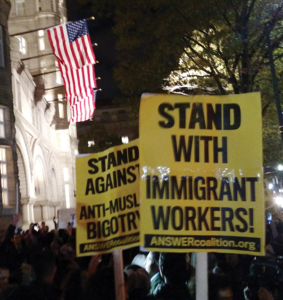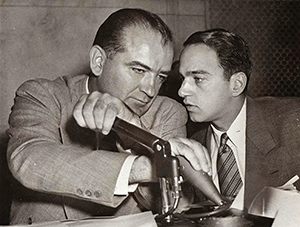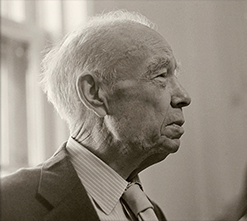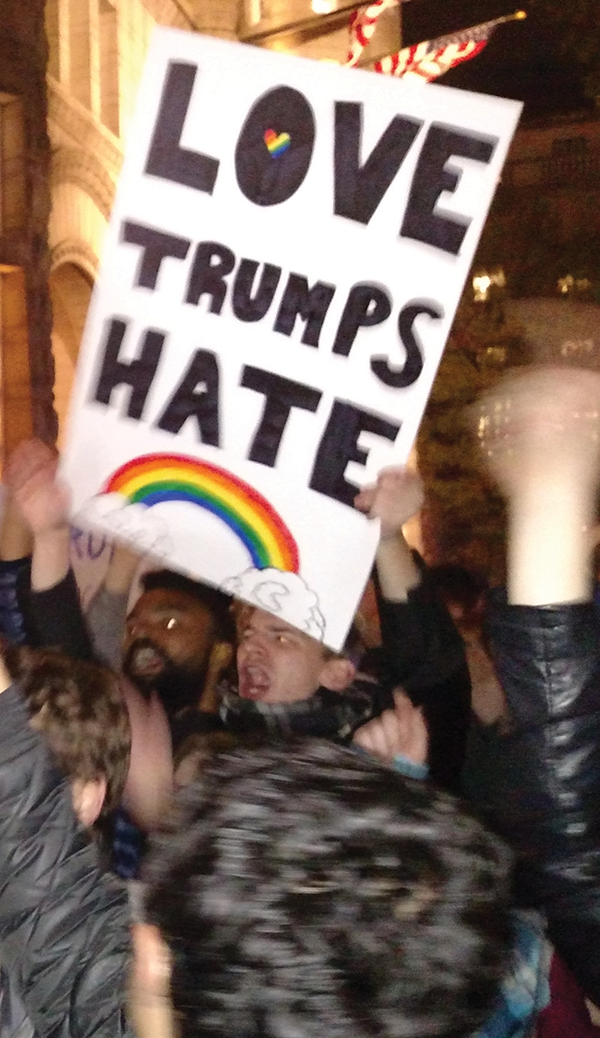Who Will We Speak For? Humanism’s Role in Defending Human Rights and Civil Liberties

“First they came for the Socialists,
and I did not speak out—
Because I was not a Socialist.
Then they came for the Trade Unionists,
and I did not speak out—
Because I was not a Trade Unionist.
Then they came for the Jews,
and I did not speak out—
Because I was not a Jew.
Then they came for me—
and there was no one left to speak for me.”
—Martin Niemöller (1892–1984), Protestant pastor and protester of Adolf Hitler who spent the last seven years of Nazi rule in concentration camps
FOR MANY HUMANISTS and those in the progressive community at large, these past weeks have, in some ways, felt like decades. We’ve seen Hillary Clinton win the popular vote for president by an enormous margin and still lose the Electoral College to Donald Trump, who is now president-elect. We’ve seen Stephen Bannon, who fueled the fires of racism, sexism, and bigotry in his time at Breitbart News, named as a chief strategist for the Trump administration, as climate change deniers and individuals with no respect for church-state separation (Alabama Senator Jeff Sessions, for one) are being nominated or considered for other top positions. We’ve heard talk of legislation that would chip away at our constitutional right to free, peaceable assembly, such as Washington State Senator Doug Ericksen’s bill to classify street protests as a form of “economic terrorism.”
But we’ve also seen hordes of people ready to defend their freedoms and civil liberties, and the American Humanist Association staff is working hard to respond to a massive uptick in volunteers, donations, and memberships. And so with uncertainty and anxiety, there is also hope.
One worrisome development is former House Speaker Newt Gingrich’s comments this past summer Fox and Friends about reviving the House Un-American Activities Committee. While Gingrich recently told the Washington Post that he didn’t expect to hold a cabinet position under Trump, he strongly suggested that he’d be involved in the administration “to network across the whole system and look at what we have to do to succeed.”

Lawyer Roy Cohn (right) with Sen. Joseph McCarthy
The House Un-American Activities Committee (HUAC), as many humanists likely know, is infamous for subpoenaing and blacklisting Americans for supposed involvement in Communist activity and for influencing US Senator Joseph McCarthy (R-WI). The McCarthy era brought us pernicious Establishment Clause violations and “under God” in the Pledge of Allegiance, an addition humanists are still fighting to remove, most recently through the American Humanist Association’s Pledge Boycott (dontsaythepledge.com). More seriously, HUAC and McCarthyism severely crippled Leftist movements and normalized violations of basic constitutional rights in ways that still haunt us today. (See The Age of McCarthyism by Ellen Schrecker, which describes how scandals like Watergate and the Iran-Contra Affair can be traced to the McCarthy era.)
Humanists certainly weren’t exempt from the attention of HUAC and McCarthyism, given that atheism was associated with supposedly “godless communism,” and humanism has a long history with the Left. One humanist leader, Corliss Lamont (author of The Philosophy of Humanism and a tireless supporter of civil liberties), had the temerity to stand up to McCarthy. As the New York Times stated in his obituary, Lamont “won court fights against censure by Senator McCarthy and mail censorship by the Central Intelligence Agency.” When he was subpoenaed, Lamont insisted upon his right as a free citizen not to answer questions about his politics or beliefs. He fought for this right in court and eventually prevailed in a major victory not only for himself but for the civil liberties of all Americans.

Corliss Lamont
While Lamont’s story is a triumph of the humanist movement, it’s also a cautionary tale for our present times. The return of HUAC may seem farfetched, but Russia critic Masha Gessen warns in her November 10 New York Review of Books article, “Autocracy: Rules for Survival,” that the first rule of living in an autocracy is to believe the autocrat. Presumably, this command also applies to those close to the autocrat. If Gingrich has Trump’s ear and is talking about reviving an institu-tion that ran roughshod over ordinary Americans’ basic First Amendment rights, then we should take this threat seriously. While many news outlets and pundits, as well as sitting President Barack Obama, have attempted to normalize this most recent development in US politics, we must recognize that this situation is not politics as usual. Politics as usual doesn’t involve authoritarian pronouncements, threats of suing journalists for libel in the course of their jobs, foreign, fascist fringe parties celebrating, or a flurry of hate crimes and racist graffiti. Politics as usual does not involve talk of a Muslim registry that’s eerily similar to the Nazi’s registry for Jews in Germany and to the United States’ internment of Japanese Americans during World War II. Rather than giving in to the comfort of denial or rationalization, humanists should heed Gessen’s call to be outraged:
[I]n the face of the impulse to normalize, it is essential to maintain one’s capacity for shock. This will lead people to call you unreasonable and hysterical, and to accuse you of overreacting. It is no fun to be the only hysterical person in the room. Prepare yourself.
Gessen’s article is a must-read for anyone concerned about basic human rights and freedoms in the United States. It paints a grim picture of what resistance must look like under a Trump presidency by drawing on parallels to Russia and other authoritarian states. Gessen further warns: don’t be taken in by signs of normalcy or reassurances that the situation isn’t as bad as it seems; don’t trust institutions to save you because they can easily be co-opted or dismantled by the authoritarian state, particularly the free press and the courts; maintain outrage; don’t settle for compromises or cooperation; and remember that nothing lasts forever, not even Donald Trump, so there is hope for the future.
Humanists are in a unique position to demonstrate outrage. We’re already accustomed to being called hysterical in situations where we know our essential liberties are on the line, even if those around us refuse to see the problem or don’t take it seriously. In our work to maintain the separation of church and state, we are often accused of being too politically correct or whiny. We are told that it’s only a nativity scene on public grounds or just a simple prayer being said in a public school. We’re told to get over it and move on. But we don’t, because we know that even seemingly insignificant infringements upon our precious civil liberties pave the way for larger violations of our rights. We must harness that capacity for outrage now—not just to defend church-state separation but to protect all of our basic human rights and civil liberties.
 We can start by directing that outrage at the notion that the government would profile and register people based on their race and religion, as the Muslim registry would do. While current discussions of this registry would focus on immigrants, Trump said during his campaign that he would require all Muslims to register, presumably including US citizens. Humanist groups should reach out to their local mosques and Islamic community centers and ask them what their community needs are and how to help. The humanist movement, unfortunately, doesn’t always have the best track record of working with the Muslim community, but we must put aside any quibbles we might have about differences in beliefs or culture and see those in the Muslim community as our brothers and sisters.
We can start by directing that outrage at the notion that the government would profile and register people based on their race and religion, as the Muslim registry would do. While current discussions of this registry would focus on immigrants, Trump said during his campaign that he would require all Muslims to register, presumably including US citizens. Humanist groups should reach out to their local mosques and Islamic community centers and ask them what their community needs are and how to help. The humanist movement, unfortunately, doesn’t always have the best track record of working with the Muslim community, but we must put aside any quibbles we might have about differences in beliefs or culture and see those in the Muslim community as our brothers and sisters.
Now is the time for us to stand in solidarity with those who face oppression, whether they are undocumented immigrants in danger of losing their basic human dignity or women in danger of losing their hard-won reproductive rights. We must stand up for all people of color and LGBTQ individuals, who are terrified by the bigotry unleashed by Trump’s campaign and his coming presidency. We must stand up for healthcare for the elderly and for everyone in our nation or else more than 22 million people (as estimated by Vox) will be without it, even though a national, single-payer healthcare system should be considered a human right. We must stand with the labor movement to fight for economic justice for all low-wage workers, whose rights will be threatened by Republican-controlled executive, legislative, and judiciary branches of government. We must do all that we can to protect these and other vulnerable communities and individuals, because the very foundations of our democracy, our civil liberties, and our human rights are at stake. If humanists and nontheists don’t speak up for these marginalized groups while we can, there is a distinct possibility that when we’re specifically threatened, there will be no one left to speak for us.
